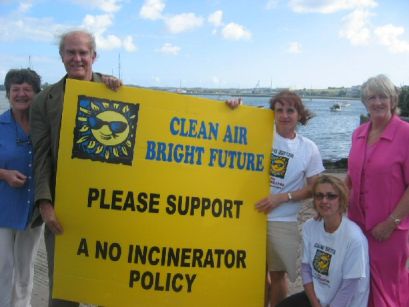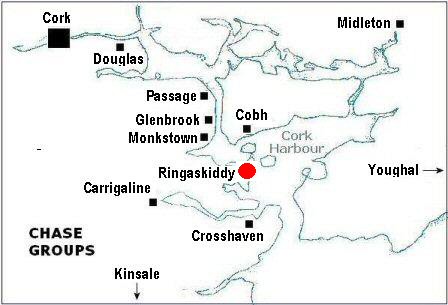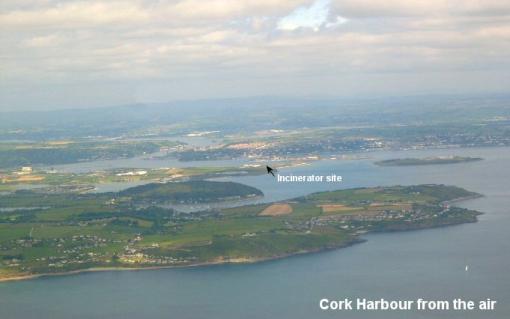No to Toxic Waste Incinerators for Cork Harbour
 national |
environment |
feature
national |
environment |
feature  Friday September 02, 2005 04:18
Friday September 02, 2005 04:18 by Miriam Cotton
by Miriam Cotton
Stop the Burn say C.H.A.S.E.
 Why is it that Irish governments are addicted to importing ideas long recognised as abject failures - even in the countries in which they originate?
Why is it that Irish governments are addicted to importing ideas long recognised as abject failures - even in the countries in which they originate?
For the last 20 years, for instance, US authorities and industries have been abandoning the use of incinerators as a form of waste management because of the severity of the health and environmental damage they most definitely cause. Local populations in the US have defeated more than 300 incinerator proposals and the industry is now virtually extinct there. About 500 have been shut down in Japan – a country that has traditionally been heavily reliant on incineration. In Europe, according to a report by the Global Anti Incinerator Alliance, the emphasis has been on using alternative waste management techniques which in the most successful cases have resulted in an actual reduction in the amount of waste needing disposal – despite growing populations.
But Paddy is always anxious to make a big fool of himself. During that same period in Ireland, naturally, we have built commercial and other incinerators around our small country as if they were going out of style – which of course they are - and in spite of ferocious opposition to them from virtually every community in which they have been sited. In a country this size and in the context of all that is known about their dangers this is – or should be – a matter of national outrage. Nevertheless, our government is again (greetings to the 5) smirking, flirting and generally prostituting itself to another rapacious industry by facilitating a deal that will surely injure health and kill many people in this country if it is allowed to go ahead. As with the Dutch and Norwegian oil companies in Mayo (Shell and Statoil), Indaver in Belgium must not be able to believe their luck. No other European country is allowing them to do as they are doing in Ireland.
 The Cork Harbour Alliance for a Safe Environment (CHASE) has been campaigning against the development of not one, but two, large toxic/hazardous waste incinerators at Ringaskiddy in Co Cork by a company calling itself Indaver Ireland – a ‘subsidiary’ of the Belgian parent company. Support for CHASE has been gathering momentum in communities and towns all around the harbour and further afield during the last four years.
The Cork Harbour Alliance for a Safe Environment (CHASE) has been campaigning against the development of not one, but two, large toxic/hazardous waste incinerators at Ringaskiddy in Co Cork by a company calling itself Indaver Ireland – a ‘subsidiary’ of the Belgian parent company. Support for CHASE has been gathering momentum in communities and towns all around the harbour and further afield during the last four years.  The city itself is just minutes as the crow flies from the proposed site of the incinerators. In January 2004, without any investigation into the significance for their health of the local population - and in defiance of World Health Organisation guidelines, its own planning authority inspector and a petition presented by CHASE (signed by no fewer than 30K people and unprecedented in the history of planning objections) - nine of the ten un-elected and unaccountable government appointees at An Bord Pleanala overturned an earlier rejection of the proposal by Cork County Council. The Board’s members, who have no experience of incineration waste management, ignored the rejection of the incinerator plan by their own inspector, Mr Philip Jones, on 14 different planning grounds. The only evidence the Board appeared to accept was that of Indaver - who stand to make immense profits if they are allowed to proceed. Vested interests ride again.
The city itself is just minutes as the crow flies from the proposed site of the incinerators. In January 2004, without any investigation into the significance for their health of the local population - and in defiance of World Health Organisation guidelines, its own planning authority inspector and a petition presented by CHASE (signed by no fewer than 30K people and unprecedented in the history of planning objections) - nine of the ten un-elected and unaccountable government appointees at An Bord Pleanala overturned an earlier rejection of the proposal by Cork County Council. The Board’s members, who have no experience of incineration waste management, ignored the rejection of the incinerator plan by their own inspector, Mr Philip Jones, on 14 different planning grounds. The only evidence the Board appeared to accept was that of Indaver - who stand to make immense profits if they are allowed to proceed. Vested interests ride again.In October 2004 the Environment Protection Agency (EPA) issued a draft licence to Indaver. The EPA is an agency with a worrying track record on monitoring and responding to environmental threats – not least of which was a recent spill of 260 tonnes of caustic soda into Cork Harbour. It was not until several weeks later that the public discovered about it – by accident. The EPA itself, despite not having even been notified by the company in question at the time of the spill, was ‘satisfied’ there was no risk to public health and nothing untoward in its emergency policies and processes. Staggeringly, the agency had decided there was no necessity to alert the public. Unaware of the potential danger to them, a large group of children began a sailing course in the same part of the harbour in which the spill occurred just two days later. There have been numerous other incidents raising all the same concerns. This, then, is the agency who are entrusted with protecting our environment and who are falling over themselves to insist that incineration is safe. In a wonderful example of self-serving logic, the Director General of the EPA, Dr Mary Kelly (formerly of IBEC fame) has cited the EPA’s earlier approval of three smaller incinerators in the harbour (already in operation) as evidence for their safety! ‘I approve therefore I am’ must be their motto. This is the same Mary Kelly who apparently saw no conflict of interest in the appointment of Ms Laura Burke, a former Project Manager at Indaver, as a Director of the EPA – three months before the draft licence to Indaver was granted. We are assured that Ms Burke is ‘not involved in any decision’ relating to the Indaver incinerators. And I can see pigs flying in the sky as I type.
Perhaps emboldened by the sheer brass neck of the EPA and An Bord Pleanala, Mr Dick Roche, Minister for the Environment, Heritage and Local Government, is now looking at ways of ‘improving’ the planning process so as, presumably, to make it less embarrassing for his colleagues and their corporate chums to do this sort of thing in future - and even less accountable than they already are. That would certainly be consistent with Bertie Ahern’s now infamous observation in China (a country not exactly renowned for its record on democracy, justice and human rights) that he:
‘would like to have the power of the Mayor [of Shanghai]…I would just like that we can get through the consultation problem as quickly as possible’. (Jan 2005)
There it is, plain as day. He must have thought we couldn’t hear him from China. Why is consultation with his own citizens ‘a problem’ for the foremost, elected people’s representative of Ireland? Will the Belgian company’s plans for Cork Harbour ultimately go through on the nod?
This article can scarcely do justice to the multiple considerations which the incinerator proposal raises. CHASE have an excellent, user-friendly website which carries comprehensive information about every aspect of the project – including environmental data, legal and planning issues, press reports, various links to similar campaigns in other countries, and more besides. Anyone who lives in the ‘catchment area’ of an incinerator (which must be virtually everyone in the country by now) should visit the CHASE website.
A summary of some of the alarming facts about hazardous waste incineration (which neither the government nor Indaver will ever tell you about) is given below:
- The incinerator that does not emit dioxins has not been built. Dioxins are the most dangerous toxin known to man & there is no safe level.
(U.S. E.P.A.) - Dioxins cause, cancer in adults, developmental defects in children, genetic & birth defects.
(US EPA) - Zero levels now recommended by US EPA
(US Congress report 2000) - Mass incineration is the primary cause of dioxins in the environment
(UN Environment Programme) - Incinerators are responsible for 70% of all dioxins produced
(Stockholm Convention, 2001) - Incineration an “unacceptable risk to public health”
(Irish Doctors Environmental Association) - Indaver Ireland has no personnel with experience in running, operating or monitoring incinerators.
(Oral Hearing) - This incinerator will be monitored – from Belgium!
(Oral Hearing evidence) - Ireland does not have adequate monitoring facilities: Irish Health Research Bureau
(HRB Report 2003) - English average emission limits exceeded 553 times!
(UK Govt) - Indaver Belgium – emission limit exceeded by factor of 1,800 – August ’02! Plant temporarily closed.
(Source Indaver) - The inspector said “He was not satisfied that the incinerator would not pose a significant risk to public safety, if there is an accident”
(An Bord Pleanala Report) - For every 1M tonnes of toxic waste burnt 333,000 tonnes of toxic ash will have to be exported.
(ratio admitted by Indaver, An Bord Pleanala Oral Hearing) - Ireland only produces 15-20,000 tonnes of hazardous waste for incineration.
(Irish EPA) - Where is the extra hazardous waste going to come from?
- There is no Irish or E.U. law that can prevent the company importing waste.
- ‘Cork produces less than 10% of the waste targeted for the burner’.
(EPA Data base 2001)
From this it’s clear that, far from being about any obligation in respect of Irish hazardous waste as the government are claiming, Indaver are being encouraged to build their incinerators with a view to importing massive amounts of hazardous waste from other countries. The proposal would not make commercial sense for them otherwise because the capacity of the incinerators will greatly exceed what would be needed for Ireland’s waste if we insist on not using alternatives. Indaver themselves admit there are health and environmental risks – but prefer to divert attention to the spurious idea that these are being ‘exaggerated’, are ‘not significant’ and are only being promoted by people who ‘don’t understand’. The consensus ranged against Indaver on these points is gigantic – and still growing. As we have seen, even the EPA in the US does not agree with them. Silky arguments are presented about ‘improved’ standards and technology and careful monitoring but they are short on precise, accurate information about their exact nature and on the undoubted continuing impact of incinerators on the environment and on health – whichever model is used.
 Everything about this plan is worrying. The chosen site is, against WHO guidelines, in an area with thousands of employees, adjacent to a maritime college of 700 students, right on top of the village of Ringaskiddy, minutes from scores of other villages, towns, schools, shopping centres, farms and on land liable to flooding – as happened last winter. True to form, it seems that Minister McDowell is once again considering Spike Island (virtually beside the site) as a suitable location for another prison. Spike had been closed shortly before the original planning permission was submitted – which is ‘lucky’ because it would have been a difficult obstacle to overcome at the time. Does the Minister know something we don’t that he is allegedly confident enough to pursue these plans? Is it all a foregone conclusion? Perhaps the health risks for the inmates of the prison could be regarded as an additional aspect of their punishment? ‘You are sentenced to two years, plus annual inhalation of several kilograms of poisonous dioxins.’ Capital punishment by default?
Everything about this plan is worrying. The chosen site is, against WHO guidelines, in an area with thousands of employees, adjacent to a maritime college of 700 students, right on top of the village of Ringaskiddy, minutes from scores of other villages, towns, schools, shopping centres, farms and on land liable to flooding – as happened last winter. True to form, it seems that Minister McDowell is once again considering Spike Island (virtually beside the site) as a suitable location for another prison. Spike had been closed shortly before the original planning permission was submitted – which is ‘lucky’ because it would have been a difficult obstacle to overcome at the time. Does the Minister know something we don’t that he is allegedly confident enough to pursue these plans? Is it all a foregone conclusion? Perhaps the health risks for the inmates of the prison could be regarded as an additional aspect of their punishment? ‘You are sentenced to two years, plus annual inhalation of several kilograms of poisonous dioxins.’ Capital punishment by default?
Waste management is something that can only be resolved if government take the lead in creating safe, integrated, national and local alternatives to existing waste management schemes. But there is no escaping the responsibility that each of us carries for dealing with this situation. We have reached critical mass in Ireland and will choke, literally, in our own and other country’s dioxin pollution if we don’t do something urgently. Industrial, commercial and agricultural waste producers need urgently to clean up their act – at every point of whatever processes they use. As individuals, we have to reduce our present levels of consumption of things we do not need to help preserve diminishing natural resources. We need to reduce the amount of waste we generate and – most importantly – we need to recycle as much of our waste as possible. But, of course, on this last point we run up against government incompetence and indifference, again. Recycling in Ireland is a sham. Virtually everywhere facilities are both inadequate and extremely inconvenient to get to. Why can we not have collections for our recycled waste, as other countries do? At the same time, collection of waste that can’t be recycled has been made prohibitively expensive for many people and civil disobedience has resulted in Dublin and other places: this, in one of the wealthiest countries in the world. People are dumping their rubbish on verges and in back streets and it’s not uncommon to see people casually throwing litter from their cars or dropping it in public places without a qualm. We now have a damaging but deserved reputation as an untidy and dirty country.
At the time of writing, the decision of the EPA as to granting a full licence to Indaver is awaited. In the meantime, the High Court has granted leave for judicial review of An Bord Pleanala’s bizarre decision to overturn Cork County Council’s rejection of the project. This has obviously put the brakes on the situation temporarily but careful scrutiny of the actions of Minister Roche with regard to altering the planning process will be needed. Does anyone care to take any bets about alterations of the process favourable to Indaver? Will attempts be made to render judicial review irrelevant? Watch this space.
Related Links (added by Indymedia editor):